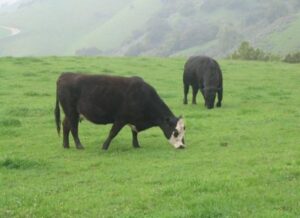Organic Valley’s ‘Grassmilk’: Yes, It’s Milk Made from Grass (Fed Cows, That Is!)

While the regulations over what counts as legitimate when companies tout ‘free-range’, ‘cage-free’ and ‘grass-fed’ continue to confuse ethical meat, egg and dairy customers, Organic Valley hopes to change some of that with its newest product, “Grassmilk.”
Cows that are raised on a 100 percent grass diet provide the only milk allowed in the Grassmilk product, according to Organic Valley, the largest cooperative of organic farmers in the U.S.
Sourced directly from Northern California farms, the cows graze daily on fresh orchard and rye grasses, dried hay, clover and other wild plants. The cows are not given any supplements or soy products. An all grass diet changes the flavor of cow milk—for the better, says Organic Valley—and it contains more naturally occurring levels of Omega-3 fatty acids, CLA (Conjugated linoleic acids) and calcium—necessary nutrients for optimal human health. The Grassmilk is minimally processed and non-homogenized.
In a statement released by Organic Valley, the company compares Grassmilk to “single-vineyard wines or artisanal chocolate” where the taste and textures are highly reliant on the regions where the cows are raised and what foods they eat.
Organic Valley, while a leader in the organic dairy sector, has been criticized for its ultra-pasteurized milk products, which the company claims provide customers with a longer shelf life. But critics of the process claim that UHT pasteurization negates the nutritional quality of the dairy products, and recent surges in raw milk consumption despite the risks (both health wise and legally), support the theory. While not unpasteurized, Grassmilk does satisfy another major concern for dairy consumers according to Organic Valley: “more than 76 percent of organic milk consumers want milk from grass-fed cows.”
Keep in touch with Jill on Twitter @jillettinger
Image: dbaron

